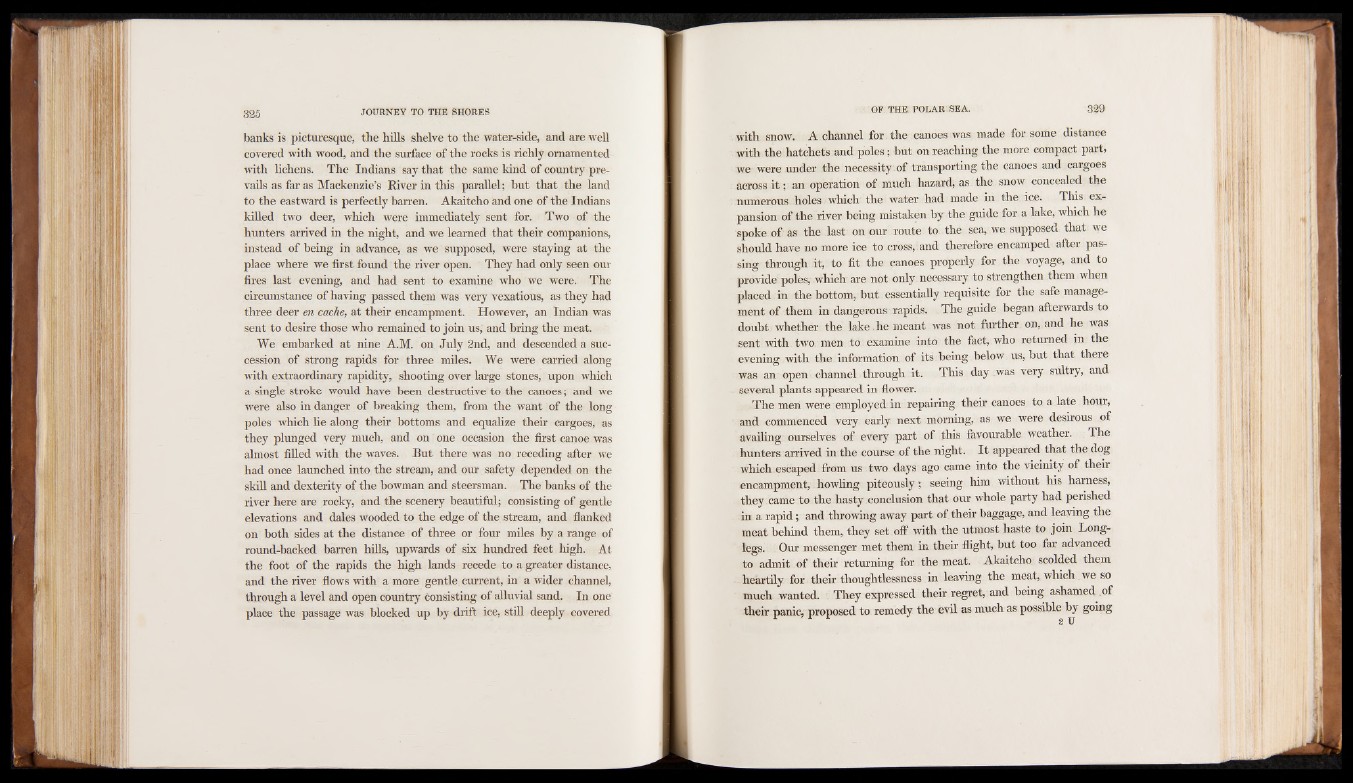
banks is picturesque, the hills shelve to the water-side, and are well
covered with wood, and the surface of the rocks is richly ornamented
with lichens. The Indians say that the same kind of country prevails
as far as Mackenzie’s River in this parallel; but that the land
to the eastward is perfectly barren. Akaitcho and one of the Indians
killed two deer, which were immediately sent for. Two of the
hunters arrived in the night, and we learned that their companions,
instead of being in advance, as we supposed, were staying at the
place where we first found the river open. They had only seen our
fires last evening, and had sent to examine who we were. The
circumstance of having passed them was very vexatious, as they had
three deer en cache, at their encampment. However, an Indian was
sent to desire those who remained to join us, and bring the meat.
We embarked at nine A.M. on July 2nd, and descended a succession
of strong rapids for three miles. We were carried along
with extraordinary rapidity, shooting over large stones, upon which
a single stroke would have been destructive to the canoes; and We
were also in danger of breaking them, from the want of the long
poles which lie along their bottoms and equalize their cargoes, as
they plunged very much, and on one occasion the first canoe was
almost filled with the waves. But there was no receding after we
had once launched into the stream, and our safety depended on the
skill and dexterity of the bowman and steersman. The banks of the
river here are rocky, and the scenery beautiful; consisting of gentle
elevations and dales wooded to the edge of the stream, and flanked
on both sides at the distance of three or four miles by a range of
round-backed barren hills, upwards of six hundred feet high. At
the foot of the rapids the high lands recede to a greater distance,
and the river flows with a more gentle current, in a wider channel,
through a level and open country consisting of alluvial sand. In one
place the passage was blocked up by drift ice, still deeply covered
with snow. A channel for the canoes was made for some distance
with the hatchets and poles; but on reaching the more compact part,
we were under the necessity of transporting the canoes and cargoes
across i t ; an operation of much hazard, as the snow concealed the
n u m e r o u s holes which the water had made in the ice. This expansion
of the river being mistaken by the guide for a lake, which he
spoke of. as the last on our route to the sea, we supposed that we
should have no more ice to cross, and therefore encamped after passing
through it, to fit the canoes properly for the voyage, and to
provide poles; which are not only necessary to strengthen them when
placed in the bottom, but essentially requisite for the safe management
of them in dangerous rapids. The guide began afterwards to
doubt whether the lake , he meant was not further on, and he was
sent with two men to examine into the fact, who returned in the
evening with the information of its being below us, but that there
was an open channel through .it. This day was very sultry, and
several plants appeared in flower.
The men were employed in repairing their canoes to a late hour,
and commenced very early next morning, as we were desirous of
availing ourselves of every part of this favourable weather. The
hunters arrived in the course of the night. It appeared that the dog
which escaped from us two days ago came into the vicinity of their
encampment, howling piteously; seeing him without his harness,
they came to the hasty conclusion that our whole party had perished
in a rapid; and throwing away part of their baggage, and leaving the
meat behind them, they set off with the utmost haste to join Long-
legs. Our messenger met them in their flight, but too far advanced
to admit 'of their returning for the meat. Akaitcho scolded them
heartily for their thoughtlessness in leaving the meat, which we so
much wanted. They expressed their regret, and being ashamed of
their panic, proposed to remedy the evil as much as possible by going